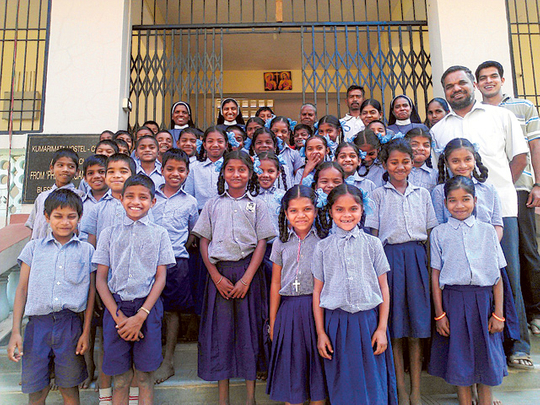
Dubai: Feeding, supporting, educating and investing in 70 children so they can have a better future may seem a lot, especially if you only rely on your monthly income.
But for Dubai-based Indian businessmen Hilary De Veiga and Vijay Varghese, the sacrifice is well worth it. They have ‘adopted’ 70 Indian schoolchildren who live in a poor village called Chisda, located in the union territory of Daman on the boundary of Gujarat.
De Veiga and Varghese, along with 38 other residents, took it upon themselves to support the kids after seeing their living conditions in 2006.
“When we saw this village of Chisda, we saw that the people are staying very far away, and for the children to come to school on a daily basis was not really possible,” De Veiga told Gulf News.
“There were government schools there but they weren’t really up-to-speed. They are two grades below their actual teaching. And, after Grade 4 to Grade 5, there was no high school, so the children would drop out,” he added.
Also, for the families there that depend mostly on farming, sending their children to school was considered a luxury since they help on the farm. Families in the village earned a meagre Dh10 a month.
This was the reality for Kumarimata School. Its students were barely surviving and the school was barely standing.
“Conditions were very bad. The bricks were falling. The roofs were leaking. Water seeped through the walls and the children were being made to sit on plastic. And then there was one incident of a child being bitten by a snake. It was not safe. So, they requested us to build a new one,” Varghese told Gulf News.
For the Prem Sangam Group based at St Mary’s Church in Dubai, of which De Veiga and the 39 others are members, it was clear something had to be done. “Generally, the whole focus was to see the children well-educated so they settle down well in life,” Varghese said.
So they set aside a portion of their income to build a whole new dormitory that could double as a school within the school compound.
“We didn’t really say it was 10 per cent, we said whatever you can give — sometimes it was 10, sometimes it was less, sometimes it was more. Some of the people have retired and have gone back so there was no way they could give anything. Some of them have lost their jobs. Even among the few of us we had our own difficulties, but despite the difficulties whoever could give, whatever they could give, they gave,” De Veiga said.
The initial construction budget to finish the two-storey dormitory that could house 70 to 80 children was Dh350,000 in 2008. But by the time it was finished in 2014, construction costs totalled Dh790,000, more than twice the projected amount because of the many difficulties the group faced on site.
The dormitory, which formally opened in February, became more than just a new school for the children; it symbolised hope.
“Chisda is a very rural and remote place. Many children don’t go to school because they live far away. The children who used to stay with us in the old facility lacked focus and motivation,” Father John Diniz, in-charge of the dormitory, told Gulf News in a phone interview from India.
But all that has changed, Fr Diniz said.
“We are very grateful to the group because though they were far away, they thought about the children. They made sacrifices to inspire change in society and in the children’s lives.”
Though the building is already completed, the project in Chisda is far from over. De Veiga said they aim to ‘teach the community how to fish’ in the long run. They aim to give the kids better books to read, mattresses, linens, towels, and other essentials. But they will need help.
“Our message to the residents of Dubai is very simple. Our closets have too many clothes, our tables are full of a lot of food and a lot of wastage goes from there. Sometimes, with Dh1 a day, which you spend on a bottle of water or on soda or whatever, you could probably feed one child. So Dh1 a day, that’s all. It can come from anywhere, anyhow, but just a dirham a day can help put a smile on a child’s face,” De Veiga said.




